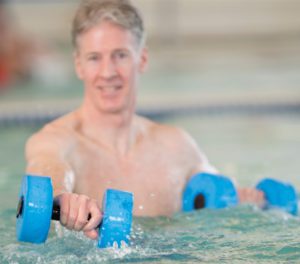 As we age, many people find it more difficult to get around and maneuver their way throughout their daily activities. Perhaps you’re worried about tripping over uneven pavement or flooring. Maybe you are already using a cane or walker, but still feel apprehensive about your stability, or maybe you have already had the traumatic experience of falling and now need assistance.
As we age, many people find it more difficult to get around and maneuver their way throughout their daily activities. Perhaps you’re worried about tripping over uneven pavement or flooring. Maybe you are already using a cane or walker, but still feel apprehensive about your stability, or maybe you have already had the traumatic experience of falling and now need assistance.
Having your gait (stride) checked by a professional therapist is extremely helpful for many individuals with age-related symptoms, and also for people with recent injuries that have an inhibited sense of balance.
Improving Balance in the Water
A therapist can work with you one on one to evaluate your balance, walking ability, foot rotation, steadiness, and control. The therapist will devise a fall prevention program specifically for you in mind. In recent studies, water therapy has proven to be an excellent source in helping individuals to gain their balance back by retraining the body to walk stronger with more stability. In addition, warm water aquatic therapy stimulates balance and body awareness, as it also helps to build muscle definition without any force on the joints.
Aquatic therapy offers one of the safest environments for patients, because losing balance in the water prevents injuries. For this reason, Freedom Rehab therapists can challenge their patients on a much higher level than on land, which effectively accelerates healing and gait improvement.
What is Aquatic Therapy?
On land, walking is a very beneficial way to workout with low impact, but in saying that, three times your body weight is the amount of pressure put on your knee joints while walking. For example, if you weigh 180 pounds, then 540 pounds of pressure are on your knee joints with every step.
When the body is submerged in water, it has buoyancy, which reduces stress on joints and muscles because the water opposes the weight of the immersed limbs. If an individual that weighs 180 pounds is under water, that person will only weigh about 10 pounds in the water. Since our bodies are approximately 15-18% fat, the fat weighs virtually nothing in the water, which helps with agility and promotes a feeling of lightness. This is extremely beneficial for protecting our joints.
A professional rehabilitation therapist can help increase your range of motion and flexibility within aquatic therapy treatment. From underwater treadmills to bikes, weights, belts and tubes, there are many different types of equipment that can assist you in water treatment, but it is sometimes just as beneficial to use no equipment in aquatic exercising. The specially trained therapists will decide which therapy is right for your specific needs. Underwater (usually waist high) you will build up the strength of your muscles, making them stronger through resistance training, utilizing your own body against the pressure of the water.
The Recognized Results of Aquatic Therapy
If you are immersed to your waist, your body will weigh only 50% of its actual weight, and if you are immersed to your chest, it’s approximately 25% of your weight. This weight reduction is helpful to relieve pain and to protect weak bones, muscle tears or joint friction. Water exercise can help you lose weight, as you will burn calories, and it also promotes relaxation throughout the entire body, which is beneficial for healing and overall health and wellness.
Individuals that have undergone aquatic therapy have shown great results in improving their balance. Many people no longer require canes or walkers after their sessions have concluded. Each session is approximately 30 minutes long, and your therapist will decide exactly what’s best for you.
To find out more about how aquatic therapy can help you, please visit, freedomrehabaqautictherapy.com, or call Freedom Rehab at 941-400-1505.









